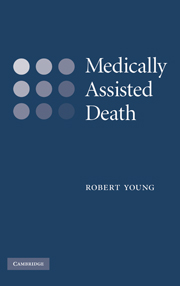Book contents
- Frontmatter
- Contents
- Acknowledgments
- 1 Introduction
- 2 A case for the legalisation of voluntary medically assisted death
- 3 Medical futility
- 4 Physician-assisted suicide
- 5 The sanctity of human life
- 6 Killing versus letting die, the doctrine of double effect, and palliative care for the dying
- 7 Professional integrity and voluntary medically assisted death
- 8 Competence and end-of-life decision making
- 9 Advance directives
- 10 Voluntary medically assisted death and slippery slope arguments
- 11 Non-voluntary euthanasia
- 12 Concluding remarks
- References
- Index of English-language legal cases
- Index of names and subjects
10 - Voluntary medically assisted death and slippery slope arguments
Published online by Cambridge University Press: 05 June 2012
- Frontmatter
- Contents
- Acknowledgments
- 1 Introduction
- 2 A case for the legalisation of voluntary medically assisted death
- 3 Medical futility
- 4 Physician-assisted suicide
- 5 The sanctity of human life
- 6 Killing versus letting die, the doctrine of double effect, and palliative care for the dying
- 7 Professional integrity and voluntary medically assisted death
- 8 Competence and end-of-life decision making
- 9 Advance directives
- 10 Voluntary medically assisted death and slippery slope arguments
- 11 Non-voluntary euthanasia
- 12 Concluding remarks
- References
- Index of English-language legal cases
- Index of names and subjects
Summary
Proposals to legalise voluntary euthanasia (as distinct from physician-assisted suicide) have commonly been met with counter-arguments to the effect that legalisation would put society on a slippery slope that will inevitably result in non-voluntary euthanasia being widely practised. They were again prominent in the debates surrounding the Bill recently introduced by Lord Joffe into the UK House of Lords concerning Assisted Dying for the Terminally Ill. Given that they are so persistently relied on by opponents of voluntary medically assisted death it is important to make a thorough assessment of their worth. Here are three variants on the theme.
If voluntary euthanasia were to be legalised it would prove impossible to avoid the legalisation, or, at least, toleration, of non-voluntary euthanasia. But, even if the former can be justified, the latter clearly cannot. Hence, it is better that the first step (legalising voluntary euthanasia) not be taken so as to prevent a slide into non-voluntary euthanasia.
If voluntary euthanasia were to be legalised it would signal society's approval of medically assisted death as a means of escape from life's difficulties and so would open the floodgates to requests from people not suffering from a terminal illness who want to be assisted to die while they are relatively healthy, because they dread having to face a problematic future existence (perhaps, for example, because of having been diagnosed with Alzheimer's disease), or because they are depressed, or disabled, or just feel excluded from their community. To avoid any such slide, society should resist the legalisation of voluntary medically assisted death and, instead, provide those who request it with the support necessary to enable them to make decisions free from the effects of socially coercive forces (like lacking access to adequate resources, or being victims of social discrimination).
[…]
- Type
- Chapter
- Information
- Medically Assisted Death , pp. 178 - 195Publisher: Cambridge University PressPrint publication year: 2007



